How Are Scores Calculated?
Credit reports are histories of all your financial obligations, and how you managed them. Credit scores are the results of a calculation based on the information in your credit report. A high credit score means you are more likely to pay a lender as agreed, and a low credit score means you are unlikely to pay a lender as agreed.Lenders want to know if you’re a good risk for their money. To determine that, they look at how many debts you have, what the totals are and your track record for repayment. Additionally, they look at how many lenders are currently willing to lend you money.
Even though every company uses a different calculation, those differences are generally minor. The big items tend to stay very similar. Your credit usage, and payment history are almost always the two most impactful score variables. In the PLUS Score calculation they make up approximately 61% of your credit score.
Bureau Scores VS. FICO Scores
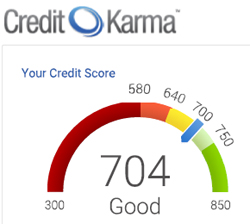 Scores provided to you by Third party providers such as freecreditreport.com, creditkarma.com, truecredit.com or myiqreport.com are the “Bureaus Scores” or “PLUS Scores”. Bureaus scores are accessed my most dealerships, insurance companies, property management companies, etc. in order to qualify you for a financial liability.
Scores provided to you by Third party providers such as freecreditreport.com, creditkarma.com, truecredit.com or myiqreport.com are the “Bureaus Scores” or “PLUS Scores”. Bureaus scores are accessed my most dealerships, insurance companies, property management companies, etc. in order to qualify you for a financial liability. We generally tell our clients to sign up for one of these third party providers – even though they do not provide our clients with their FICO scores – they give the client an idea of their score progress. The scores can be updated every month or every week (creditkarma.com).
FICO scores in the other hand, are accessed by most mortgage lenders. FICO scores are in general about 15-20 points lower than Bureaus Scores, and are calculated differently. FICO scores can be purchased through their website www.myFICO.com.
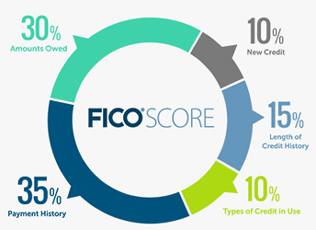 Payment history (35%): The first thing any lender wants to know is whether you’ve paid past credit accounts on time. This is one of the most important factors in any type of score.
Payment history (35%): The first thing any lender wants to know is whether you’ve paid past credit accounts on time. This is one of the most important factors in any type of score.Amounts owed or Credit Usage (30%): Having credit accounts and owing money on them does not necessarily mean you are a high-risk borrower with low scores. What is mostly taken in consideration is high balances versus low balances, considering your credit limit.
Length of credit history or Age of accounts (15%): In general, a longer credit history will increase your scores. However, even people who haven’t been using credit long may have high scores, depending on how the rest of the credit report looks. Your scores take into account:
1) how long your credit accounts have been established, including the age of your oldest account, the age of your newest account and an average age of all your accounts;
2) how long specific credit accounts have been established;
3) how long it has been since you used certain accounts.
Types of credit in use or Account types (10%): The score will consider your mix of credit cards, retail accounts, installment loans, finance company accounts and mortgage loans.
New credit (10%): Research shows that opening several credit accounts in a short period of time represents a greater risk – especially for people who don’t have a long credit history.
Inquiries (10%): Lenders want to know you are not a potential risk for having too many inquiries, meaning too many accounts being opened at the same time.
Different FICO scores for One Single Individual
There are multiple variations of FICO scores, depending upon industry. One individual can have up to 5 different FICO scores variations, as shown below. When you purchase your FICO score, you are first given your general FICO score: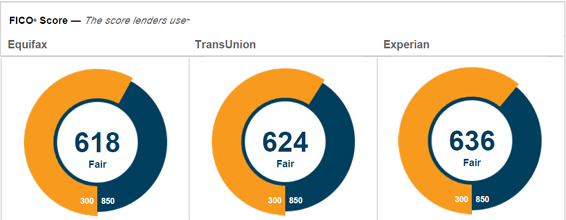
Your are also given the FICO scores used by the mortgage industry (loan officers, realtors, mortgage lenders, etc):
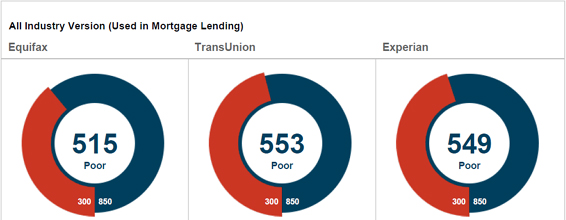
Even though most dealerships use Bureau scores, some choose to use FICO scores for the Auto Industry. Within the auto industry alone there are 3 variations of FICO scores. Your auto lender chooses which version of FICO they want to use.
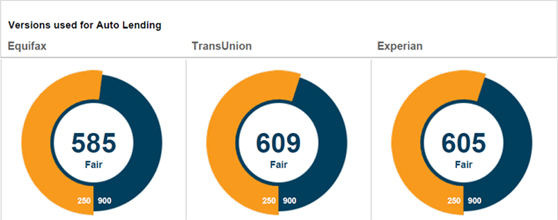
Understanding how scores work is very crucial in your credit repair process. Even though our money back guarantee isn’t score based, we understand the main reason clients sign up for our credit repair process is to raise his/her scores. We educate our clients when it comes to the different types of scores and different ways to improve existing scores. Contact us today!
